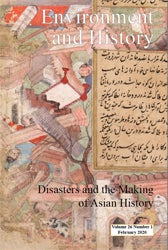Journals

Environment and History – Special Issue: Disasters and the Making of Asian History (Vol. 26, Issue 1)
| Author | : | COURTNEY Chris & WILLIAMSON Fiona (Guest Eds) |
| Publication Date | : | Feb / 2020 |
| Publisher | : | The White Horse Press |
Environmental historians have often been drawn to disasters. They have unearthed the often-forgotten stories of erupting volcanoes, raging rivers and rainless skies, and in so doing have reminded their colleagues from more anthropocentric disciplines that the societies, economies and cultures they study are part of broader physical systems. In addition to highlighting the agency of nature, however, disasters have also helped to remind us that environmental history remains at heart a humanistic discipline. It should never be simply a lament for lost natural habitats, but also a discipline which offers a unique prism through which to study people. It is perhaps for this reasons that environmental historians continue to use inherently anthropocentric words such as ‘disaster’ and ‘hazard’. These terms fail to recognise that disturbances that look catastrophic from the perspective of human beings might not have such negative effects when viewed from the perspective of an ecosystem. A forest fire or a flooded river might pose a hazard to an individual plant or animal that is burned or drowned as a consequence, yet in systemic terms neither is disastrous, as such physical processes offer other organisms in the vicinity opportunities to exploit new territories and sources of nutrition. Indeed, over time such disturbances can even promote the general biodiversity of an ecosystem. A disaster is, therefore, a relative concept, which offers a species-specific rather than a holistic perspective on the environment. From the perspective of many other species, the rise of humanity has probably been the worst disaster since the Cretaceous–Paleogene extinction event. Yet generally when historians talk about disasters they are talking about their own species, and perhaps a few other species that humans have come to rely upon for their own subsistence.
From ARI Conference on “Disastrous Pasts: New Directions in Asian Disaster History”, 21-22 November 2016.

